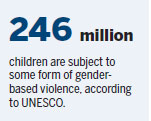UN publication's goal to help form sex ed programs
By Liu Xuan | China Daily | Updated: 2018-01-12 10:30
The revised edition of the International Technical Guidance on Sexuality Education provides meaningful reference at a time when pregnancy and childbirth complications are the second leading cause of death among teens 15 to 19 years old, experts said.
The fully updated publication was released on Wednesday in Paris by UNESCO, nearly 10 years after its first edition, to advocate quality comprehensive sexuality education as a way to promote health and well-being, respect for human rights and gender equality.
The guidance was produced in collaboration with UNAIDS, UN Population Fund, UN Children's Fund, UN Women, and the World Health Organization based on the latest scientific evidence.

It included 12 national sexuality education projects as well as more data from less developed countries.
The publication provides a comprehensive set of eight key concepts, topics and illustrative learning objectives to guide the development of locally adapted and age-appropriate curricula, from which children and young people ages 5 to 18, or even older, can benefit to lead healthy, safe and productive lives.
According to UNESCO, an estimated 246 million children are subject to some form of gender-based violence, including sexual harassment and bullying. Globally, only 34 percent of young people can demonstrate accurate knowledge about HIV prevention and transmission.
Fabio Scano, officer-in-charge of the WHO in China, said sexuality education is not only a way to prevent disease, but also a social issue on gender norms.
The publication provides information and guidance to young people about the transition from childhood to adulthood and the physical, social and emotional challenges they face.
Yu Xiaoming, a professor at Institute of Child and Adolescent Health of Peking University, said the new version is worth learning and sets an good example for countries to promote sexuality education.
"The updated guidance is more systematic and well-organized," she said. "It emphasizes cultural relevance, encouraging educators to design curricula based on their own cultural characteristics."
Babatunde Ahonsi, representative of the UN Population Fund to China, also wishes China can have a national plan and outline on sexuality education in the near future.
"We have done a great pilot project in Sichuan province and hope to show the government the positive impact and changes of the work to promote the formulation of relevant policies," he said.
liuxuan@chinadaily.com.cn
























